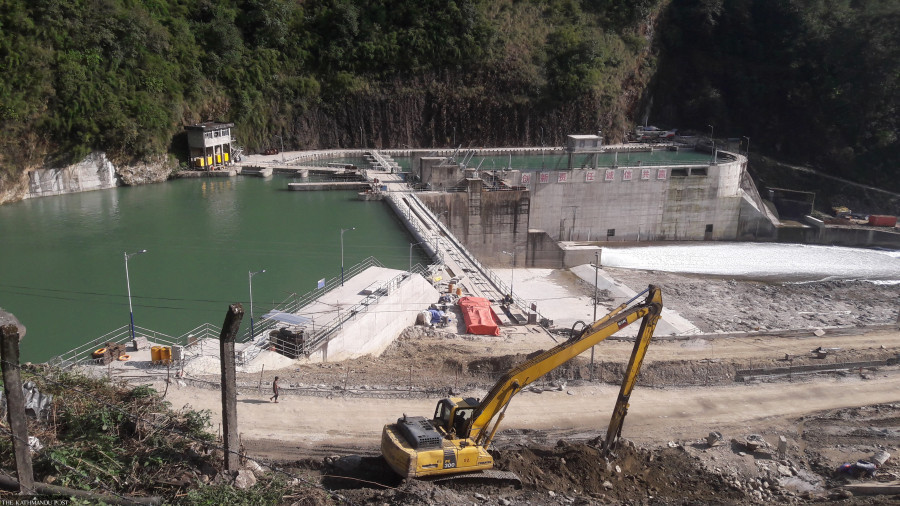National
Nepal, Bangladesh agree to involve India in Sunkoshi-3 project
Though the two countries agreed to sign a bilateral joint venture accord, they are open to involving India as per the wish of the southern neighbour.
Prithvi Man Shrestha
Securing India’s approval to sell Nepal’s electricity to Bangladesh is on the agenda of Prime Minister Pushpa Kamal Dahal’s discussions in New Delhi where he reached on an official visit on Wednesday.
As India’s permission for its territory and its transmission infrastructure to be used for selling Nepal’s power to Bangladesh is important, the two countries want to involve India in the development of a power project that they plan to jointly develop in Nepal.
A senior Nepal Electricity Authority (NEA) official said Nepal and Bangladesh have agreed in principle to involve India for the development of the 683 MW Sunkoshi 3 hydropower, making the project a trilateral venture.
During the fifth meeting of the secretary-level Joint Steering Committee on energy cooperation between Nepal and Bangladesh on May 15-16 held in Bangladesh’s Patuwakhali, the two countries decided that the NEA and Bangladesh Power Development Board (BPDB) would sign a joint venture agreement within the next six months to develop the project.
The project is located at the border of Ramachhap and Kavrepalanchok districts of central Nepal.
Dirghayu Kumar Shrestha, chief of transmission directorate at the NEA, said the two countries also agreed to keep space for potential inclusion of an Indian company as equity partner in the joint venture company.
During the meeting, Nepal had proposed to the Bangladeshi side to involve India in the project as it would help to ensure market as well as facilitate transmission of power. “Bangladeshi government proposed to sign a bilateral joint venture agreement first by opening the space for roping in India as equity investor,” said Shrestha, who was also a member of the Nepali delegation. “The sides agreed on involving India if the latter agreed to become an equity partner.” But the issue of involving India was not included in the press statement issued by the energy ministry.
Chiranjeevi Chataut, director general of Department of Electricity Development, also confirmed that the two sides discussed bringing India as equity partner in the project. “The project can be developed through trilateral cooperation too if all sides agree,” he said.
Before making the proposal to the Bangladeshi side, the Nepal government had conducted an extensive discussion on the matter among its various agencies related to energy, officials said.
Nepal and Bangladesh discussed involving India in the project, in the context that the southern neighbour has also shown eagerness to promote connectivity among Bangladesh, Bhutan, India and Nepal (BBIN).
As per the Joint Vision Statement on Power Sector Cooperation between Nepal and India issued in April last year, the two countries agreed to expand cooperation in the power sector and include partner countries under the BBIN framework.
Both Nepal and Bangladesh want not only to use the existing transmission infrastructure of India for trading of power but also want to develop a dedicated line for trading of power through the Indian territory.
Two countries don’t share borders and the southern neighbour’s cooperation is vital to ensure trading of power between Nepal and Bangladesh.
Officials said involvement of India in generation of power which is supposed to sell power to Bangladesh, will help secure India’s facilitation for trading of power between Nepal and Bangladesh.
Nepal has completed the feasibility study and environment impact assessment (EIA) of the Sunkoshi-3 project. Currently, its licence is with the Nepal government and the new joint venture company will have to acquire a survey licence from the government.
“Even though the feasibility study has already been completed, the new company needs to take a survey licence first as per our legal provision,” said Chataut. “During the survey period, it can take a generation licence as well.”
Power-hungry Bangladesh has been eager to develop hydropower projects in Nepal and buy electricity from the country. During the meeting, the two sides agreed to initiate trading of electricity from the upcoming wet season with export of 40–50MW from Nepal to Bangladesh by using the existing transmission infrastructure of India.
The Bangladeshi side had also notified Nepal that GMR Upper Karnali Hydropower and the Bangladeshi side would soon sign a power sale agreement, enabling the Indian infrastructure giant to sell 500MW of electricity to be produced by 900MW Upper Karnali Hydropower Project in western Nepal.




 9.83°C Kathmandu
9.83°C Kathmandu














